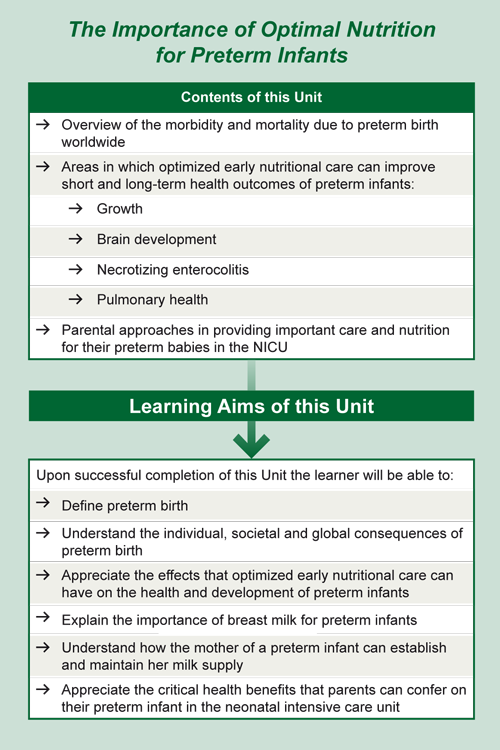常规
Welcome to Unit 1 -The Importance of Optimal Nutrition for Preterm Infants
Each year, an estimated 15 million babies are born prematurely, before completing 37 weeks of gestation. That is more than 1 in every 10 babies born worldwide. Although survival among premature infants has improved, prematurity is a leading contributor to neonatal mortality. Prematurity complications are also the leading cause of death in children under the age of 5. Although the rates of preterm birth in many countries are increasing, improved conditions of care for premature infants have led to markedly increased survival rates over the last few decades. Therefore, increased attention is now directed to improving long-term outcomes, health and quality of life.
Accumulating evidence demonstrates that optimal nutritional care is a central tool in the management of the preterm infant and has a high impact in the long-term outcome and quality of life. Normal fetal growth in utero is extremely rapid. Fetal body weight doubles in only 6 weeks between 30 and 36 weeks of gestation, along with remarkable tissue differentiation. To be able to match such quantity and quality of growth remains an enormous challenge (Koletzko et al. 2014).
Many factors affect premature infants, for example lower gestational age at birth, smaller size for gestational age, intracranial hemorrhage, white matter damage, infections, and socioeconomic status. While these are sometimes beyond the control of neonatal intensive care providers, meeting the nutritional needs of the preterm infant may be an easier approach with a beneficial impact on prognosis and later life (Ramel & Georgieff 2014).
The likely duration that the Learner will need to engage with the Material is 180 minutes.
Please feel free to ask questions, give comments and discuss topics related to this unit.
Please note that ENeA is an English-speaking platform and be so kind as to post your comments in English only, so that all participants can understand. Postings in a language other than English will be deleted.
